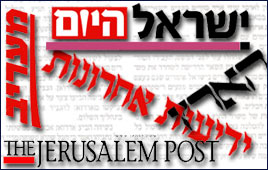|
Summary of editorials from the Hebrew press
Today’s issues: Israel’s gatekeepers, free Ahed Tamimi, new threats at the end of the tunnel, Israel’s efforts are paying off, and where the Trump administration may be getting it right.
The Jerusalem Post slams the Interior Ministry’s visa-issuing procedures, which are seemingly based on an extreme Orthodox worldview, particularly in connection with issuing of visas for Reform and Conservative Jews, and contends that this discrimination “combines militant ultra-Orthodoxy with blatant racism.”
Haaretz calls on the government to free Ahed Tamimi, who was arrested last week after video footage went viral showing her punching and kicking an Israel Defense Forces officer, and asserts: “Just as the IDF officer in the incident chose to forego his honor, and in fact earned great respect for the army, the military judicial system must also act this way too. Tamimi and her relatives must be a llowed to return home, and the IDF needs to recognize the value in moderation and to encourage its soldiers to act with the minimum required force – certainly against unarmed young girls.”
Yediot Aharonot comments that 2017 has been the worst year for Hamas in the 30 years of its existence, and states: “Not only is it beginning to lose the tunnels as a weapon, but the Shin Bet has clipped its wings in the West Bank and prevented a significant terror attack, despite the incitement and funds flowing into the strip from Turkey and the Gulf emirates.” The author points out the the cross-border attack tunnels are swiftly losing their viability as strategic attack weapons, and notes: “the alternative options considered by the terror organization include upgraded rockets, quadcopters armed with explosive charges, underwater tunnels and using car bombs to break through the obstacle being built by the IDF.”
Israel Hayom discusses the results of US President Trump’s warning to countries who voted in favor of the U.N. vote declaring recognition of Jerusalem as Israel’s capital ‘null and void,’ and states: “If under President Theodore Roosevelt, U.S. foreign policy could be surmised as ‘speak softly, and carry a big stick,’ then Trump appears to believe that the U.S. should talk tough and wave an even bigger stick. Quite a few countries have internalized the message and acted accordingly.” The author contends that the result of the vote is not only a reflection of Trump’s tough talk, but is also due to Israel’s foreign policy, and adds: “On Thursday, we saw that Israel’s diplomatic efforts are beginning to bear fruit. We should therefore try to see the cup as being one-third full – and continue to work to fill it fuller.”
Globes compares differences in the foreign policy of the current and previous US administrations, particularly noting the obstruction and systematic sacrifice of vital strategic interests of both the United States and Israel of the Obama administration on the one hand and the new document published in the past few days entitled the National Security Strategy of the United States of America, and opines that based on this document, if its guidelines are followed in practice, “the relationship between Israel and the United States is in good hands. Already the veto cast by the US in the UN Security Council and the announcement that countries that vote against the right of the United States to decide for itself where to put its embassies may jeopardize American aid give reason to believe that such may, indeed, be the case.”
[Alex Fishman, Ron Prosor and Norman Bailey wrote today’s articles in Yediot Aharonot, Israel Hayom and Globes, respectively. |


